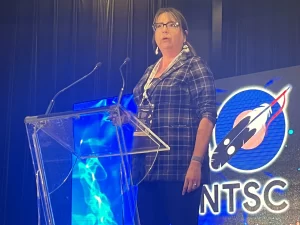Wiikwemkoong member provides solid waste details at Niagara Falls conference

By Sam Laskaris
NIAGARA FALLS – Heidi Manitowabi loves trash talking.
Manitowabi, a citizen of Wiikwemkoong Unceded Territory, is a regional solid waste specialist in engineering and infrastructure for the Ontario First Nations Technical Services Corporation (OFNTSC).
Manitowabi delivered a presentation titled, Waste Management Funding, at the OFNTSC conference, TechNations 2025 – Empowering Future Generations: 30 Years of Service and Innovation, which concluded on May 13 in Niagara Falls.
The OFNTSC was established in 1995 to provide technical advisory services to First Nations throughout Ontario.
During her presentation, Manitowabi said health, education, and crumbling infrastructure often dominate conversations about Indigenous communities.
“Solid waste, and I’m talking garbage, is often not a priority,” she said. “So, I want to make it a priority.”
Manitowabi discussed the First Nations Solid Waste Management Initiative, which offers funding through Indigenous Services Canada (ISC). She also talked about solid waste support programs available through the OFNTSC, as well as the importance of collecting baseline information and what is done with that information.
Manitowabi said that solid waste programs were funded through the Integrated Capital Management System before 2016.
Many First Nations still receive funding through ISC via a formula. Funding for solid waste management is determined in part by where a community is located in the province. That annual funding ranges from $3,000 to $23,000.
“It is nowhere near the amount of funding that is needed to properly manage a landfill site,” Manitowabi said. “Not only is a properly managed landfill site good for community appearance – a healthy community will have a good landfill system. But landfills can have such a negative impact on both public health and environmental health.”
Manitowabi said that in Ontario, during the 2024-25 fiscal year, $1.18 million was available for solid waste operation and maintenance programs and an additional $12.72 million for capital programs.
“We need to demonstrate a need for ongoing funding,” she said. “The First Nations Solid Waste Management Initiative will be sun-setting in 2028, which is a short three years away. And we need to advocate for ongoing sustainable funding to improve solid waste management systems in our communities.”
Manitowabi provided conference delegates with additional information on the two streams of funding available.
Operation and maintenance programs include feasibility studies, technical engineering studies, site operations planning, as well as waste site closure and post-closure plans.
Meanwhile, capacity-building and training funding are available for the training of waste operators, regional waste formation, and general community education.
The capital category also includes infrastructure operations. Thus, this grouping includes the construction or upgrading of an existing landfill site and transportation, as well as equipment purchases like contractors or shredders.
Manitowabi is confident that trash will remain a relevant topic for the foreseeable future.
“Waste is an issue that this isn’t going away anytime soon,” she said. “And modern issues require modern solutions. There’s a lot of talk about decolonizing. But when we’re dealing with a giant, giant, giant pile of garbage, this is a direct negative impact of colonization. This is what our people have to deal with.”
But Manitowabi said communities should be encouraged that officials with the OFNSTC solid waste program are available to provide some assistance.
“We have been building capacity and we have increased capacity on our team,” she added.

